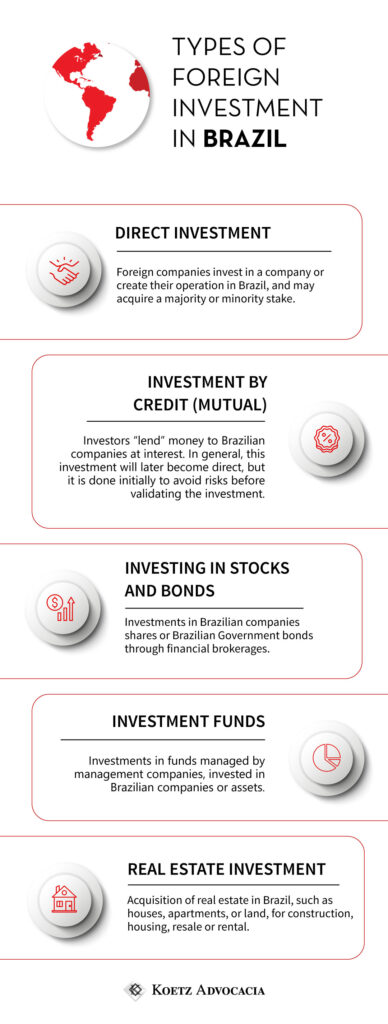
Invest in Brazil: A Guide for Foreign Investors
Investments in Brazil are a huge opportunity for any investor, even if they are foreigners. However, they must be careful about foreign investment in Brazil to comply with national requirements to not miss out on this huge opportunity presented by Brazilian trade. Let’s see how to safely invest in this segment.
If you need legal assistance from our team, please message us on WhatsApp.
Author: Leonardo Almeida Lacerda de Melo
Foreign investment in Brazil: doing business safely
Brazil is a country with a diversified economy and attracts foreign investors in many sectors, including energy, technology, agriculture, infrastructure, among others. In other words, it opens up space for interesting foreign investment in Brazil.
Foreign direct investment (IED), for example, has been an important source of financing for many companies and for the Brazilian economy in general.
In 2020, the year at the height of the Covid-19 pandemic, for example, Brazil received around US$34 billion in IED. This represents a decrease compared to previous years, but is still a significant amount, given that we were experiencing the largest epidemic since the bird flu a hundred years earlier.
The sectors that received the most foreign direct investment in Brazil were: electricity, oil and gas, financial services, and information technology. In addition, the country is also a popular destination for infrastructure investments, including highways, ports, airports, and railways.
While there are many investment opportunities in Brazil, there are also challenges that investors need to consider. Bureaucracy and tax complexity are some of the issues that can make business in Brazil difficult.
Furthermore, Brazil also has a complex regulatory environment that can be difficult for foreign investors to navigate. This demonstrates the need to hire a specialized firm, such as Koetz Advocacia, to advise on this endeavor, ensuring that there are no major difficulties and enabling to take advantage of the immense opportunity that is investing in Brazil.
The Brazilian government has also taken measures to improve the business environment in the country, including tax reform and infrastructure modernization. These initiatives may make Brazil even more attractive to foreign investors in the future.
To summarize, foreign investment in Brazil is significant and has the potential to grow even further. However, it is important that investors are aware of the challenges and stakeholders involved, as well as the opportunities and measures that are being taken to improve the business environment in the country.
Types of foreign investment in Brazil
There are several types of foreign investment in Brazil. Some of the most common forms of foreign investment are the most sought after precisely because they offer excellent cost/benefit and include:
- Direct investment: direct investment occurs when a foreign company invests in a Brazilian company or establishes its own operations in Brazil. The foreign investor can acquire a majority or minority stake in the Brazilian company, depending on the agreement;
- Investment by credit (loan): this type of investment seeks a return on the amounts invested in a Brazilian company, with interest stipulated in the contract. The initial idea is to have no responsibility for the relationships of the invested company, with the sole intention of obtaining the return in the form of interest. However, this type of investment is immensely more common with the intention of converting the credit into equity interest, which would be direct investment. The reasons for this type of investment to begin as a loan are based on allowing the invested company to structure itself with the amount received before the investor takes a risk in an equity interest.
- Investment in stocks and bonds: Another common type of foreign investment is the purchase of stocks or bonds issued by Brazilian companies or the Brazilian Government. Investors can invest in stocks or bonds issued by the Brazilian government through brokerage firms and other financial institutions;
- Investment funds: Foreign investors can also invest in investment funds that operate in Brazilian companies or in Brazilian assets. These funds are managed by investment management firms and can be purchased through brokerage firms and other financial institutions;
- Real estate investment: Investing in real estate is another popular form of foreign investment in Brazil. Investors can purchase real estate in Brazil, including houses, apartments, land and commercial properties, for the purpose of resale or rental.
Text continues after infographic.

These are some of the most common types of foreign investment in Brazil. It’s important that investors carefully evaluate the available options so that they choose the best model according to their needs and their full business vision.
Restrictions, precautions, and taxation on foreign investment in Brazil
There are some restrictions and precautions that foreign investors should keep in mind when investing in Brazil. There are some regulatory issues that investors should be aware of. An example of this is the prohibition of foreign capital participation in strategic sectors defined by law, such as radio broadcasting companies in border areas.
Regarding the Brazilian tax system, it can be complex and onerous. Foreign investors should inform themselves about the applicable rates and taxes before making a foreign investment in Brazil and consider how they may affect the return on investment. Likewise, Brazil is a country with a history of political and economic instability.
Foreign investors should be aware of the political and economic risks and carefully evaluate the investment environment before making a decision. In other words, foreign investment in Brazil deserves attention.
Among the various types of taxes, the one with the greatest impact is Income Tax. With this tax, investors are taxed on capital gains made in Brazil. The income tax rate varies depending on the type of investment, the investment term, and the tax treaty between our country and the investor’s country of origin.
The Tax on Financial Transactions (IOF), applies to financial transactions, such as investments in stocks, bonds, and funds. The IOF rate varies according to the type of investment, term, and nature of the transaction.
The Tax on Services (ISS) is a municipal tax charged on services provided in Brazil. The rates vary between municipalities and can be applied to transactions such as consulting, investment management, and other financial services.
Finally, the Social Contribution to Net Income (CSLL), is a federal tax applied to companies’ net income. Foreign investors who invest in Brazilian companies are subject to this tax.
It is also important to remember and pay attention to the fact that investment transactions in Brazil are subject to registration fees, which vary according to the type of transaction desired and carried out by the investor.
In addition to these taxes and fees related to foreign investment in Brazil, investors may also be subject to other tax obligations, such as filing income tax returns and obtaining a National Registry of Legal Entities (CNPJ) in Brazil.
Although some policies and laws seek to protect foreign investors, there are still challenges in implementing these laws. Investors should carefully evaluate the legal protections and guarantees the Brazilian government offers before making an investment. The country, in turn, also has a volatile currency and foreign investors should be aware of the exchange rate risks when investing in the country.
In summary, foreign investors should carefully evaluate domestic investment options and consider the risks and restrictions associated with each type of investment. It’s important to have a clear investment strategy and seek appropriate legal and financial advice before making an investment decision in Brazil.
Opportunities offered by Brazil for foreign investment
Brazil offers several opportunities for foreign investment, as the country has a rich diversity of natural resources, such as minerals, oil, natural gas, water, fertile land, and others, which can be exploited for production and export purposes.
Text continues after infographic.

It’s possible to find, nationally, a qualified workforce in various sectors, including technology, engineering, science, and others, at a relatively low cost compared to other countries. Likewise, the country is one of the largest consumer markets in the world, with a population of over 200 million people and a constantly growing middle class.
The text continues after infographic.

Brazil has also advanced in the digitalization of government services, with the implementation of electronic systems for tax declaration, and issuing of licenses, among others, facilitating the conduct of business. The Government has taken measures to simplify bureaucracy and make the business environment more favorable and competitive.
Another benefit of Brazil is the fact that it has relatively low taxes on inheritance, donations, and assets, which can be attractive to investors who wish to transfer their assets to the country. Brazil currently also exempts tax on dividends, which can be attractive to investors who wish to make a profit from direct investments in Brazilian companies.
Representation business models:
a) agency, distribution, and commercial representation contracts
Agency and Distribution were part of the old Brazilian Commercial Code, but now they are part of the Civil Code and are two distinct contracts that are part of the same device.
These are contracts through which a person, who is now called an agent, undertakes to promote the business of another person, who is now called the proponent, and with whom the latter has no relationship of dependence, subordination, or work in a given area, in exchange for receiving remuneration.
The Commercial Representation Contract is similar to the Agency Contract and the Representation Contract is generally used by Legal Entities. There is no prohibition by law for Legal Entities to use the Agency Contract, but it’s not common.
In this case, the agent will not conclude the business promoted by him in the interest of the proponent, unless the latter grants him a power of attorney because of a Mandate for him to conclude the business.
The Distribution Agreement differs from the Agency Agreement in that the distributor has the product to be negotiated. The name remains that of the proponent (or owner of the business) but changes to that of the distributor (of agent).
The Agreement will determine the area in which the agent will promote the Proponent’s business, and the agent unless otherwise provided for in the contract, will be entitled to exclusivity in the area that was determined for him.
Once the agent has exclusivity in his area of operation, even if the business is concluded due to the promotion of a third party, the agent will still be entitled to remuneration.
If the Contract is for an indefinite period, both the agent and the proponent may terminate it, provided that they notify the other party within at least 90 days.
Although the Civil legislator uses terms such as “dismissal” and “just cause” in the articles relating to Agency and Distribution, this is not an employment relationship, but rather a Contract, and the ways to terminate a Contract are termination, resolution, and rescission.
This is a model of Consensual Contract, as it’s perfected based on the Consent between the agent (or distributor, who is also called an agent) and the proponent, and is also bilateral (synallagmatic) since it generates reciprocal obligations for both parties.
Finally, it is onerous, as the agent will be entitled to remuneration (also called commission, although this contract is not a commission); commutative, as the parties are aware of the services due; non-solemn, and may be verbal or written; and very personal (intuitu personae), because only the contracted agent can act as such, in addition to being ongoing.
A commercial representation contract is an agreement between a given company and its direct representative in a region where it seeks to present its product/service but does not have the local infrastructure to do so.
The main idea of the representative is that he/she sells the product or service independently, without there being an employment relationship between the two.
In Brazil, the commercial representative’s activity is governed by Law 4,866/65. This provision will outline the basic guidelines for drafting a commercial representation contract, making it a regulated activity.
It’s important to observe the need for the commercial representative to act in good faith when acting on behalf of the contracting company. The representative must report on his/her activities, as well as keep the contracting company informed of the entire commercial scenario of the region in which the representative will operate. Regarding the term of validity, this may be determined or indefinite.
To protect the parties, it’s important to clearly define the obligations of both parties, as well as the compensation for possible losses and damages.
Since the contract is international, greater care must be taken in defining the applicable law and jurisdiction, given the greater volatility of both in international relations.
b) intellectual property licensing and assignment agreement (including software)
This is an agreement granting the use of certain intellectual property (software, literature, images, audio, among others) for a certain period, which may be free or for a fee.
Regarding the characteristics of the agreement, this is typical, as it’s provided for by Laws 9,279/96 and 9,610/98, and may be for a fee or not, if the assignment is free, bilateral, and necessarily for a specific period.
The idea is to grant the use of the property to the other party in exchange for previously agreed amounts or free of charge. The agreement must also provide for the conditions of use of the intellectual property.
Representation of a foreign company by a Brazilian attorney (joint and several liability)
In Brazil, foreign companies are required by law to hire a Brazilian attorney to represent them in the country with directorial powers, in case they open another company to operate in Brazil.
In this case, it’s important to note that this attorney will be considered jointly liable for the obligations assumed by the foreign company in Brazil.
This means that if the foreign company fails to comply with its tax, labor, or commercial obligations in Brazil, the Brazilian attorney may be held liable for these obligations together with the foreign company. The attorney may be required to pay debts and compensate third parties on behalf of the foreign company.
This joint and several liability is provided for by Brazilian law and aims to ensure that foreign companies comply with their obligations in the country. In other words, encouraging foreign investment in Brazil.
Foreign companies must be aware of this responsibility when hiring a Brazilian attorney and choose a representative who is trustworthy and experienced in the legislation to invest.
Furthermore, it’s essential that the Brazilian attorney is aware of the foreign company’s obligations in Brazil and is in constant communication with the company to ensure that its obligations are met.
The attorney must also keep accurate and up-to-date records of all the company’s activities in Brazil and monitor compliance with legal and tax obligations.
If you need legal assistance from our team, please message us on WhatsApp.

